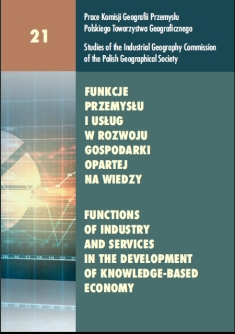Knowledge as a Basic Development Factor of Industry and Services
DOI:
https://doi.org/10.24917/20801653.21.24Keywords:
knowledge, redefinition, pragmatism, industry, servicesAbstract
The subject of this article is knowledge as a basic instrument, which can be applied in industryand services. Currently, a status of this kind of knowledge is changeable and most frequently it isconnected with pragmatic dimension of contemporary business. At present it seems that the ancient andmedieval idea of disinterested knowledge belongs to the past.The main aim of this paper is an attempt to redefine the real meaning of knowledge in modern timesand to establish what impact business sphere has on social relationships. Changes which occur in wayswe relate to each other, in my mind, are a result of expansionist and attractive world of economy for thecontemporary human being.Nowadays, the pragmatic knowledge narrows them only to the instrument of increasing profit andbuilding competitive advantage in business. The most important and visible changes in the meaning andfunction of knowledge occur in industry and service sectors.Downloads
Metrics
References
Bauman, Z. (2012). To nie jest dziennik. Przeł. M. Zawadzka. Poznań: Wydawnictwo Literackie.
Brzozowski, T.T. (2009). Teleworking/telecommuting – system podnoszący stopień zinformaty¬zowania sektora pracy. Szanse i zagrożenia dla społeczeństwa informacyjnego. Prace Komisji Geografii Przemysłu Polskiego Towarzystwa Geograficznego, 13, 143–159.
Brzeziński, J. (1996). Doświadczenia uniwersytetu europejskiego a przyszła organizacja szkolnictwa wyższego w Polsce. W: Idea Uniwersytetu u schyłku tysiąclecia. Praca zbiorowa. Warszawa, 91–101.
Castells, M., Aoyama, Y. (1994). Paths Towards The Informational Society: Employment Structure in G-7 Countries, 1920–90. International Labor Revirew, 133.
Cyrek, M. (2007). Wybrane koncepcje pomiaru gospodarki opartej na wiedzy. W: M.G. Woźniak (red.), Nierówności społeczne a wzrost gospodarczy. Gospodarka oparta na wiedzy. Praca zbio¬rowa, Zeszyt Nr 10, Katedra Teorii Ekonomii Uniwersytetu Rzeszowskiego, Rzeszów, 208–224.M.eke
Dylus, A. (2005). Globalizacja. Wrocław: Ossolineum.
Friedman, T.L. (2005). The world is flat. A Brief history of the globalized. World in the Twenty-first Century. London: Penguin Books.
Hannerz, U. (2006). Powiązania transnarodowe. Kultura, ludzie, miejsca. Przeł. K. Franek. Kraków: Wydawnictwo Uniwersytetu Jagiellońskiego.
Sassen, S. (2007). Globalizacja. Eseje o nowej mobilności ludzi i pieniędzy. Przeł. J. Tegnerowicz. Kraków: Wydawnictwo Uniwersytetu Jagiellońskiego.
Lyotard, J.F. (1997). Kondycja ponowoczesna. Przeł. M. Kowalska, J. Migasiński. Warszawa: Aleteia.
Mielcarek, P. (2008). Innowacyjność polskich przedsiębiorstw na tle Unii Europejskiej. Przedsiębiorczość – Edukacja, 4, 108–115.
Nowak, P. (2012). Poziom innowacyjności polskiej gospodarki na tle krajów UE. Prace Komisji Geografii Przemysłu Polskiego Towarzystwa Geograficznego, 19, 153–168.
Porębski, L. (2003). Rewolucja informacyjna jako źródło nowych podziałów społecznych, W: R. Borkowski (red.), Globalopolis. Kosmiczna wioska. Szanse i zagrożenia. Warszawa: Pax.
Soros, G. (1999). Kryzys światowego kapitalizmu. Warszawa.
Taylor, Ch. (2002). Globalopolis. Kosmiczna wioska. Szanse i zagrożenia. Przeł. A. Pawelec. Kraków: Znak.
eWallerstein, I. (2007). Ain I.rzeł. K. Gawlicz, M. Starnawski. Warszawa: Dialog.
Cyrek, M. (2007, 27 sierpnia). Wybrane koncepcje pomiaru gospodarki opartej na wiedzy. Pozyskano z: http://www.univ.rzeszow.pl/pliki/Zeszyt10/16.pdf.
Gazda, P. (2011, 13 stycznia). Internet 2010 w liczbach: biliony e-maili, miliardy użytkowników, setki milionów stron. Pozyskano z http://webhosting.pl/Co.sie.dzialo.w.Internecie.w.2010.roku.
Vobacom. (2013, 7 lipca). Pozyskano z: http://www.vobacom.pl/Rozwoj_Internetu_w_Polsce_i_na_ swiecie.
Raport Strategiczny IAB Polska Internet 2012 (2013, 6 lipca). Pozyskano z: http://www.iabpolska.pl/ index.php?mnu=91.
Szarucki, M. (2013, 27 sierpnia). Pozycja Polski na tle wybranych krajów w rankingu gospodarki opartej na wiedzy. Pozyskano z: http://www.naukaigospodarka.pl/index.php?option=com_con-tent&view=article&id=285%3Apozycja-polski-na-tle-wybranych-krajow-w-rankingu- -gospodarki-opartej-na-wiedzy&catid=39%3Aartykuly&Itemid=108&lang=pl.
Cyrek, M. (2013, 4 lipca). Wybrane koncepcje pomiaru gospodarki opartej na wiedzy. Pozyskano z: http://www.univ.rzeszow.pl/pliki/Zeszyt10/16.pdf.
Raport (2013, 11 stycznia). Pozyskano z: http://www.parp.gov.pl/files/74/81/380/10838.pdf /.
Downloads
Published
How to Cite
Issue
Section
License
Articles are published under the terms of the Creative Commons License (CC BY-ND 4.0; Attribution– NoDerivs).

